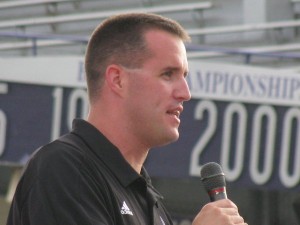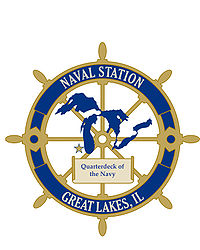With his military style buzz haircut, overt intensity, and passion for the many qualities unique to both college football and the military, Pat Fitzgerald would fit in quite well with the United States Armed Forces. The leader of the Northwestern Wildcats program held a team practice at Naval Station Great Lakes, and plans to hold another Wildcats practice on base this summer.
On Thursday, in cooperation with the Great Lakes Naval Museum, celebrating the proud heritage of athletes at Great Lakes, Fitzgerald led a roundtable discussion of five former Sailor-Athletes who played for Great Lakes during World War II.
Athletes on dais included: Ralph Jecha (football 1953-1954) and played for Northwestern 1950-1952, and in the NFL for both the Chicago Bears and the Pittsburgh Steelers; Don Lesher (1945 football); Stacy Mosser (1943 football); Ernest Bauer (1944 football); and Bill Downey, who also played for Marquette.
Most interesting of all was the proud athletic history of Great Lakes, and learning what a power they once were in both college football and college baseball.
By Paul M. Banks
George “Papa Bear” Halas after his time as an All-American End with the Illini in Champaign-Urbana, was the MVP of the 1919 Rose Bowl with Great Lakes; the proudest victory in the program’s history. The Bears founder was eligible to play because he was serving as an ensign in the Navy. In 1943, Great Lakes beat an undefeated Notre Dame team 19-14.
“We played a full schedule, of hard nose football, and a we were proud sailors,” Mosser said.
Other football legends to serve and play for Great Lakes included 1947 Heisman trophy winner Johnny Lujack, who was a star for the Fighting Irish and the Bears, Otto Graham, perhaps the greatest player in Northwestern and Cleveland Browns history. And Frank Leahy who’s statue graces a gate at Notre Dame Stadium, an honor to his four national titles.
During WWII Great Lakes teams were coached by Paul Brown, the father of the modern offense and founder of both the Cincinnati Bengals and Cleveland Browns. The Blue Jackets football team used to play in a stadium with capacity of 25,000 right outside the Ross Theatre, where this roundtable was held. They last played Northwestern in 1943, losing 13-0. Jecca went on to play in the Salad Bowl, which he described as “a fore-runner of the Fiesta Bowl.”
They have a proud tradition in baseball too, lead by Cleveland Indians Hall of Famer, and Navy Chief Petty Officer Bob Feller. Between Pearl Harbor and Victory Japan Day, Great Lakes’ baseball teams went 188-32. And Feller once pitched a 1-0 shutout and struck out 12 to lead the Great Lakes Blue Jackets in a defeat over the Chicago Cubs in front of 12,000 sailors at Constitution Field.
As an official Department of the Navy museum, the Great Lakes Naval Museum’s mission is to select, collect, preserve, and interpret the history of the United States Navy with particular emphasis on the Navy’s only “boot camp” at the Naval Station Great Lakes. The museum is located at the main gate. During my short time on base, I had the chance to tour the museum.
I also got to tour a significant portion of Naval Station Great Lakes, the largest military installation in Illinois and the largest training station in the Navy. It’s basically like a small city, and it hosts the Navy’s only Recruit Training Command. Each year approximately 40,000 men and women complete the requirements to become enlisted Sailors at the Navy’s only boot camp.
Naval Station Great Lakes, located 15 miles from the Wisconsin state border, and between the towns of North Chicago and Lake Bluff, is also home to the Navy’s technical training schools for surface warfare excellence at Training Support Center Great Lakes. Yearly, more than 14,000 students attend these initial and advanced training schools where they learn the basic skills of their Navy jobs.
During 2011, Naval Station Great Lakes is celebrating its Centennial with a yearlong series of events, including the official birthday celebration on July 1, 2011.
For more information about Naval Station Great Lakes, visit their Facebook page
Paul M. Banks is CEO of The Sports Bank.net , a Midwest webzine. He’s also a regular contributor to Chicago Now, Walter Football.com, Yardbarker, and Fox Sports
He does a regular guest spot each week for Chicagoland Sports Radio.com You can follow him on Twitter @thesportsbank and Facebook

